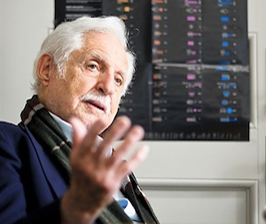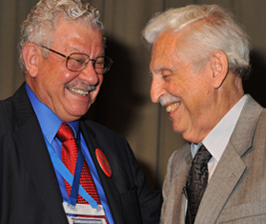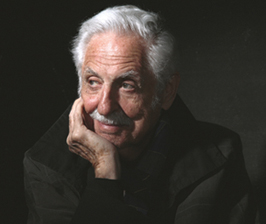
1923-2015



 |
||
1923-2015 |
||
 |
 |
 |
| October 23, 2023 Guest Editorial: Celebrating Carl Djerassi Chemical & Engineering News |
||
June 23, 2019 "After long experimentation, Dr. Rosenkranz and his colleagues, the chemist Carl Djerassi, an Austrian refugee, and their student lab assistant, Luis E. Miramontes, achieved a breakthrough by synthesizing a progestin they called norethindrone. It was Oct. 15, 1951, a date later recorded for posterity on the patent all three shared." |
||
| January 31, 2015 Carl Djerassi, UW grad who helped create "the pill," dies at 91 UW News |
||
| January 31, 2015 Carl Djerassi, 91, a Creator of the Birth Control Pill, Dies The New York Times |
||
October 21, 2013 |
||
November 6, 2012 |
||
| March 25, 2003 Father of the pill to debut pedagogic wordplay UW News |
||
 |
In Retrospect: From the Pill to the Pen Carl Djerassi once again displays his virtuosity as a humane scientist reflecting on his life journey as well as the idiosyncrasy of others. His honesty is refreshing as he reveals human flaws and foibles. He penetrates deeply and provokes emotions about character and behavior. His struggles with identity and insecurity are exposed openly and thus are empowering. This book by one of the most influential people of our time is a must-read. It is more striking than my favorite Djerassi autobiography: This Man’s Pill. |
|
 |
Sex in an Age of Technological Reproduction This book contains two more of Carl Djerassi’s “pedagogic wordplays”. The first play’s title, ICSI,stands for intracytoplasmic sperm injection, an artificial insemination technique. It’s one of the assisted reproductive techniques that are separating sex from reproduction. The play consists of a hypothetical interview of a researcher by a television reporter who is somewhat adversarial and sensation-minded. The second play, Taboos, sets up an interaction between a lesbian couple seeking to have a child and a heterosexual couple who are religious fundamentalists (the husband of the heterosexual couple is the brother of one of the women in the lesbian couple). The play explores the meaning of “family” and “parent” when science allows people to reproduce outside the cultural norms. Like Djerassi’s other “science in fiction” works, the plays attempt to “smuggle” science to a larger audience and explore the social and cultural ramifications of new discoveries and techniques. Like NO, the book comes with a DVD of videos and images. |
|
 |
Newton’s Darkness–Two Dramatic Views As the name implies, these plays explore the dark side of the personality of Issac Newton, focusing on his feuds with two other scientists over getting credit for discoveries. The title of Pinner’s play, Newton’s Hooke, refers to Robert Hooke, who also claimed credit for the discovery of the law of gravity. Djerassi’s play, Calculus–Newton’s Whores, explores Newton’s dispute with Gottfried Leibniz over credit for the invention of calculus. The authors make a case that Newton sometimes acted unethically and they say in their introduction, “At stake is an issue that is as germane today as it was 300 years ago: a scientist’s ethics must not be divorced from scientific achievement.” Djerassi is a distinguished chemist best known as the father of the birth control pill. He has devoted considerable effort to what he calls “science-in-fiction”, designed to “smuggle” science to the public. Pinner is a veteran actor, director and playwright who has had 18 plays produced on stage and many more on radio and television. For a longer review by Professor Shakhashiri click here:C&EN News Website. |
|
 |
NO is a relatively short “pedagogic wordplay” designed to be read in classrooms and similar settings rather than being fully staged. NO is nitric oxide, which has only recently been discovered to have many vital functions in the human body from penile erection to blood clotting to promoting nerve impulses. In the play, two scientists discuss NO with a venture capitalist who is a potential backer of their research. In the process, the audience learns a lot about science and the funding of scientific research. The co-authors are Carl Djerassi, a distinguished chemist best known as the father of the birth control pill, and Pierre Laszlo, a prolific French science writer who has been a professor of chemistry at several distinguished universities. Djerassi has devoted much of his time in recent years to “science-in-fiction”, attempting to “smuggle” science to the general public in the form of novels and plays. This book includes German, English and French versions of the play and a unique feature–a CD with the visuals used by the scientists in the play and a rap song about NO. The rap song always gets a big response from audiences and makes NO unforgettable. We highly recommend this marriage of science and art. Djerassi maintains his own website, www.djerassi.com
|
|
 |
This Man’s Pill: Reflections on the 50th Birthday of the Pill One of the inventors of the birth control pill, Carl Djerassi gives his account of the development of the pill, which differs from some other accounts, and offers his personal insights into the consequences of the pill. Djerassi, a chemistry professor at Stanford, says development of the pill occurred during a period of technological euphoria, and could not be repeated today. He also talks about the barriers, mostly social and economic, to developing a birth control pill for men. Djerassi says the pill contributed to the sexual revolution of the 1960s but did not cause it. Djerassi also speculates about the future of contraception and sex, now that sex has been largely separated from procreation. In recent years, Djerassi has turned to writing what he calls “science in fiction”. His stated goal is to smuggle science to the general public disguised as fiction. Djerassi’s writing style is clear and direct and he’s a good storyteller. His novels include Cantor’s Dilemma,The Bourbaki Gambit, and Menachem’s Seed. Djerassi has also written plays and poetry as well as hundreds of scientific articles. Djerassi maintains his own website, www.djerassi.com. |
|
 |
Oxygen This play by two renowned chemists explores the human side of science, asking who should get credit for discovering oxygen (all three claimants and their wives are presented). Carl Djerassi of Stanford is one of the few recipients of both the National Medal of Science and the National Medal of Technology and Roald Hoffmann of Cornell University is a Nobel Laureate. The play has been translated into many languages and produced in several countries. Watch the UW-Madison production UW-Madison Oxygen Symposium Program |
|
 |
Carl Djerassi: Steroids Made it Possible (Profiles, Pathways, and Dreams) A series of profiles, part of a 22-volume series, that function as a scientific autobiography, detailing everything from fleeing Bulgaria before World War II, to receiving a scholarship to study in Missouri, and beyond. It shows an evolution, from his interest in steroids to his research on magnetic circular dichroism, artificial intelligence, and marine phospholipids. This book is both scientific and personal. |
|
| HOME | ||